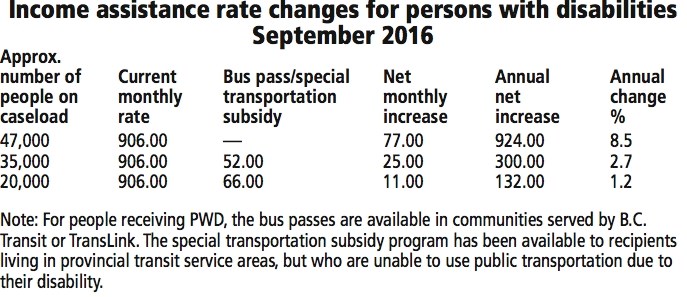This won’t eliminate the challenges those living with disabilities face, and it won’t suddenly make life easier, but we hope it will make life a little less hard.
Finance Minister Mike de Jong, Budget Speech 2016
By several measures, B.C. is in a strong financial and economic position. We are leading the nation in economic growth, balancing the budget for a consecutive fourth year, keeping personal income taxes low, reducing debt ratios and enjoying the only AAA credit rating among provincial jurisdictions.
In this context, it is distressing that this budget does not offer a genuinely compelling vision of human and social development, a vision guided by strong commitments to human rights and social justice.
Every budget contains a bundle of value choices and political calculations. This is no more apparent than in provincial social policy and the social safety net for vulnerable citizens.
B.C.’s Budget 2016 provides an additional $36 million for the coming fiscal year to increase monthly Persons With Disabilities income-assistance rates. The amount will be $65 million in 2017/18 and $69 million in 2018/19.
The nominal rate increase of $77 per month in support allowance will take effect in September this year. The new maximum for an individual will be $983.42.
It has been a long time coming. This is the first increase to PWD assistance rates since 2007.
In real terms, taking into account inflation over that period, the rate increase doesn’t compensate adequately for cost-of-living increases over that period. It falls short of what is required to make life more secure, independent and dignified.
The policy announcement also falls short of what the government has to do to meet its goal stated in Accessibility 2024 — its 10-year plan on disability policy — of making B.C. the most progressive province in Canada for people with disabilities.
However, the Clark government’s concept of social justice animating this change is prescribed in an alarmingly narrow manner.
Why a maximum increase of $77 per month? Why this particular amount?
As the table shows, with changes to the bus-pass program and, more important, the elimination of the special transportation subsidy, if the amount of increase were much lower, a substantial portion of people with disabilities on income assistance would have seen absolutely no additional benefit.
The increase is not a general lift for everyone on PWD. It produces a more similar level of financial support for the approximately 100,000 individuals who receive PWD support. However, most clients on disability assistance receive less than the $77-per-month increase.
Under the increase, people on PWD will no longer be able to purchase an annual bus pass for a $45 fee. Instead, if disability-assistance recipients want the ministry-supported bus pass, they must now pay $52 per month plus an annual $45 administrative fee, the $52 to be deducted from the monthly benefit for a net monthly increase of $22 or 2.7 per cent since 2007.
Persons on PWD who qualified for the special transportation subsidy will no longer receive an annual lump-sum payment, but will receive the $77 monthly increase, of which $66 replaces the lost subsidy, for a new monthly increase of $11 or 1.2 per cent.
A social-policy initiative is incredibly anemic when the best a government can say about its own reform is it “hope[s] it will make life a little less hard.”
Even this stunningly modest claim is highly questionable.
In his budget speech, the finance minister defended eliminating the special transportation subsidy and making the bus pass optional, as giving these impoverished people “the freedom to make their own choice about how to meet their own unique transportation needs.”
Apparently, for our provincial government, this is what “flexibility of our social safety net” means.
For many people with disabilities and their families, struggling in grim economic and social circumstances, this is a cold meaning of freedom. It is a disrespectful claim of choice for citizens confronting systemic barriers and obstacles in their everyday lives.
This meagre policy announcement effectively maintains the state of today’s poverty for current and future generations of persons with disabilities and their families who live on a very restrained income.
Did the government have the financial means to increase social assistance disability rates to a more meaningful amount? Undoubtedly, it did.
The finance minister says the provincial government will continue to monitor this program. Certainly, it will. Ethically, it must.
Democratically, we must ensure our MLAs and government leaders take steps in social investments that ensure adequate support for persons with disabilities, making better their lives and our communities.
Michael J. Prince is Lansdowne Professor of Social Policy at the University of Victoria.



